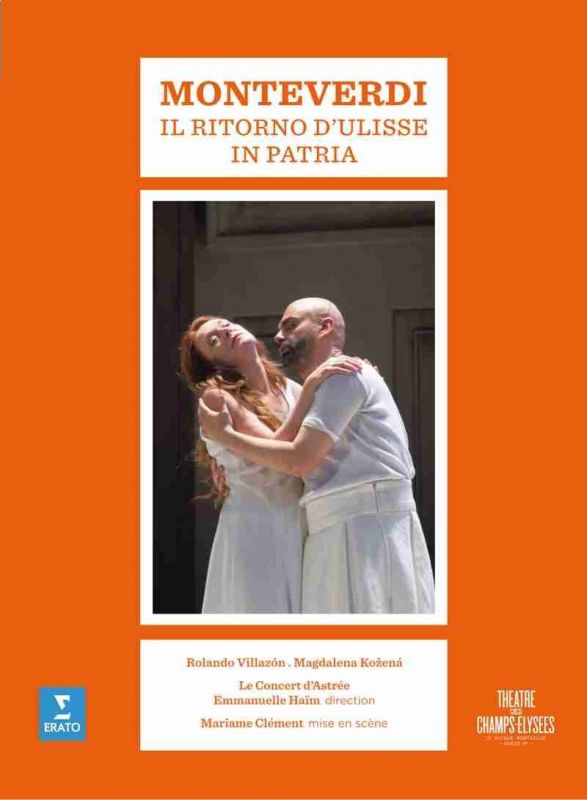MONTEVERDI Il ritorno d’Ulisse in patria
View record and artist detailsRecord and Artist Details
Composer or Director: Claudio Monteverdi
Genre:
Opera
Label: Erato
Magazine Review Date: 04/2018
Media Format: Digital Versatile Disc
Media Runtime: 197
Mastering:
DDD
Catalogue Number: 9029 57381-2

Tracks:
| Composition | Artist Credit |
|---|---|
| (Il) Ritorno d'Ulisse in Patria |
Claudio Monteverdi, Composer
Le Concert d’Astrée Orchestra Anne-Catherine Gillet, Amore; Minerva, Soprano Callum Thorpe, Il Tempo; Antinoo, Bass Claudio Monteverdi, Composer Elodie Méchain, Ericlea, Contralto Emiliano Gonzalez Toro, Eurimaco, Tenor Emmanuelle Haïm, Conductor Isabelle Druet, La Fortuna; Melanto, Mezzo soprano Jean Teitgen, Nettuno, Bass Jörg Schneider, Iro, Tenor Katherine Watson, Giunone, Soprano Kresimir Spicer, Eumete, Tenor Lothar Odinius, Giove; Anfimono, Tenor Maarten Engeltjes, L’Umana Fragilità; Pisandro, Contralto Magdalena Kozená, Penelope, Mezzo soprano Mathias Vidal, Telemaco, Tenor Rolando Villazón, Ulisse, Tenor |
Author: Iain Fenlon
To some extent this recording, which has evolved from staged performances, provides them, above all in Magdalena KoŽená’s powerfully affective reading of Penelope. Arioso writing of a highly flexible and at times lyrical kind is prominent in the score, nowhere more so than in ‘Di misera regina’, which in its contours and effective use of dissonance is clearly in a direct line of descent from the Lamento d’Arianna. Although KoŽená’s dramatic and violently oscillating portrayal of a soul in torment is superbly characterised, expertly moulding words and music into a highly charged vocal line, purists may be uncomfortable with the style of the accompaniment, with its rather busy keyboard figuration. Le Concert d’Astrée employs a sizeable continuo ensemble (which includes strings, archlute, theorbo, harp, harpsichord and organ), while also adding cornetts, sackbuts, recorders, dulcian and percussion to the already rich texture, particularly in the sinfonias, which are enjoyably delivered with brio and crisp articulation. But it must be seriously doubted whether any Venetian theatre, where impresarios concentrated their financial resources on fielding the finest vocalists, would have had recourse to such lush possibilities.
As opera moved from the privacy of the Renaissance court into the public realm of the commercial theatre, the number of characters expanded. While Monteverdi’s Orfeo was given with just a few singers and considerable doubling of parts, particularly in order to form the chorus, Ulisse, composed some 30 years later, requires 19 principal characters. Undoubtedly some roles would have been doubled here as well; but the decision to present no fewer than 14 soloists pays musical dividends and it is among the minor roles (rather than from Rolando Villazón’s rather disappointing and over-reaching performance) that some sharply chiselled characterisations emerge. Particularly notable are Jean Teitgen’s authoritative Neptune and Jörg Schneider’s nicely captured and colourful account of Iro. Rather less enthusiasm for the staging, with its initially amusing but ultimately irritating mixture of Classical, Baroque and modern dress (the suitors in back tie, Telemaco in jeans), set against backdrops of various vintages ranging from the ancient world to a rustic drinking den.
Discover the world's largest classical music catalogue with Presto Music.

Gramophone Digital Club
- Digital Edition
- Digital Archive
- Reviews Database
- Full website access
From £8.75 / month
Subscribe
Gramophone Full Club
- Print Edition
- Digital Edition
- Digital Archive
- Reviews Database
- Full website access
From £11.00 / month
Subscribe
If you are a library, university or other organisation that would be interested in an institutional subscription to Gramophone please click here for further information.




